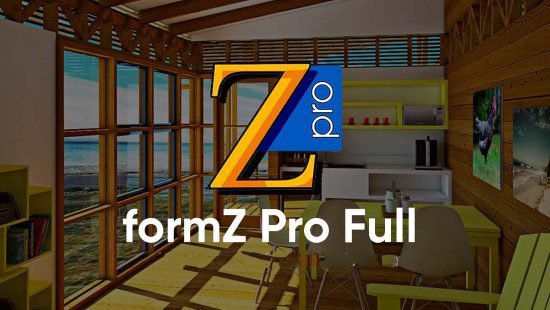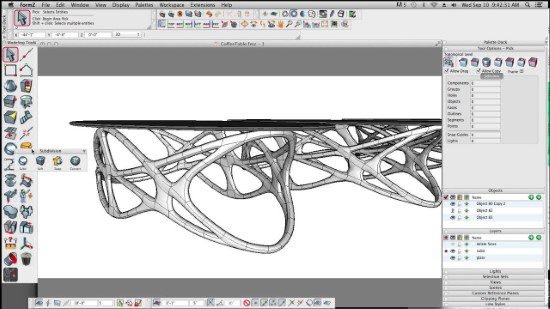Portable formZ Pro 9.2.3 (x64) Multilingual

formZ Portable is a powerful 3D design application packed with personality and modeling tools with an easy-to-use interface to express and communicate your imagination. It is based on advanced 3D surface and solid modeling methods that maintain accurate representations as you move from design to visualization, layout, animation, and production.
formZ Portable includes all the features of formZ Jr plus many advanced modeling tools, STEP and IGES translators, animations, layouts, network rendering, and interface customization. formZ pro introduces subdivision modeling as another modeling personality that allows rapid design and exploration of organic shapes from basic shapes. These forms can be easily manipulated using a subdivided set of tools that reinforce this new personality.
Features
• Accurate robust internal representation of data including 3D solids, surfaces, trimmed surfaces, NURBS and parametric representations.
• ACIS modeling engine provides advanced smooth modeling capabilities and reliable internal data representation.
• Interactive drawing tools that allow for the direct creation of any shape including lines, splines, NURBS curves, arcs, circles ellipses, and polygons
• Interactive 3D primitive creation (Cone, Cylinder, Sphere, Torus).
• Advanced 3D primitives. Interactively create Paraboloid, Hyperboloids and Hyperbolic Paraboloids.
• Sculpting tools use realtime Booleans to interactively Reshape (push/pull), Offset Segment, Offset Outline, Imprint
• Deformations alter the shape of an object with the Bend, Bulge, Taper or Twist methods while keeping them a solid accurate object.
• Advanced Deformations include Bend Along Path and 3D Morph operations.
• The Billboard tool enables the quick placement of an image as a texture in 3d.
• Basic Rounding allows for the rounding or beveling an edge of an object.
• Advanced Rounding and Blending give much more control over rounding operations and offers blending between faces of objects (fillets).
• The Cap tool constructs surfaces across opening in a model. The Cover and Uncover tools convert a wire object to a surface or vise versa.
• Lofting tools include ruled, guided, path and branched lofting.
• The Derivative tools allow for the construction of an extrusion, convergence or a wall object from (all or a part of) an existing object.
• Advanced Derivative tools include point clouds, derivative from parts of objects. The frame tool derives a structure such as a truss or space frame from the edges of an object.
• Unfold enables a model to be unfolded (flattened) with tabs and labels for fabrication and easy assembly. The projection tool flattens an object onto a plane.
• Revolve is used to derive a revolved or lathed object from a profile (source shape) and an axis.
• Helix and Sweep are powerful modeling operations that derive a new shape from the volume that a source object creates as it follows a path.
• Advanced Sweep tools (Two Source Sweep, Two Path Sweep, Boundary Sweep, Draft Sweep) offer more flexibility and power the sweep capabilities.
• Offset Surface makes a new surface parallel to the original surface. Thicken (shelling) converts a surface into a solid of a desired thickness.
• Skinning is a powerful method to create surface or solid objects from a set of source shapes and a set of paths. There are tools for Smooth Skin, Meshed Skin, and Cross Skin.
• Booleans allow for the creation of new forms through the Union, Intersection, or Difference of 3D solid objects.The Split, Slice, Line of intersection offer similar capabilities for surfaces.
• Stitching enables the joining of surfaces and the creation of solids for a closed set of surfaces.
• The Section tools allow for the creation of 2D and 3D sections of models.
• Advanced Meshing tools give real control over facets of a model. These include the 3D Mesh, Polygion Mesh, Reduce Mesh and Polygonize tools.
• Displacement creates a 3D object by added relief to a meshed surface based on an image creating the effect of the image being pushed through the surface.
• Architectural specialty tools include: Stairs, Spiral Stairs, Roofs and Terrain Models.
• Architectural specialty tools include: Switchback Stairs.
• Engineering specialty tool include; Gears, Screws and Bolts.
• Advanced creative design tools to enhance form generation. These tools include Point Scatter, Surface Scatter, Volume Scatter, Voronoi Diagram, Delaunay Triangulation, Wrap Objects and Parametric Map.
• Components make it easy to place commonly used items in a model from a library of objects. A set of libraries is provided and users can create and share their own library of objects that they create. Tools are included for placing, creating, exploding, replacing and creating components.
• Doors and Windows are special components that make an opening in a wall when placed in the model.
• Basic line editing tools: Close, Trim, Join, Fillet.
• Advanced line editing tools: Extend, Connect, Remove Point, Insert Segment, Tangent Line, Perpendicular Line.
• Measure tools for distances and angles within and between parts of the model. Calculations of surface area and volume of objects.
• Mass Properties calculations include weight, principal axis and moments of inertia.
• NURBS Loft and Reconstruct.
• NURBS curve tools: Curve Create, Reconstruct, Blend, Merge, Extend.
• Advanced NURBS curve tools : Curve Convert, Attach, Split, Insert Knot, Edit Curve, Blend Curve to Point, Convert to Arcs NURBS by Formula.
• NURBS surface tools: Surface Lofting, Boundary, UV Curves Convert, Nurbs by Cross Sections, Reconstrcut, Curve Extract, Blend, Merge, Extend.
• Advanced NURBS surface tools: NURBS by Formula, Split, Edit Surface, Insert Knot.
• Surface analysis allows you to inspect smooth surfaces in order to detect any imperfections or discontinuities in the surface. The following analysis types are offered: Zebra Stripes, Environment Map, Draft Angle, Curvature Map Normal Map, Porcupine Plot
• 3D Text Creation, Editing and Search and Replace.
• Advanced 3D Text tools: Text Along Path, Parallel Text, and Text Between Two Paths.
• Dimensions (Linear, Angular, Radial Leader Line and Notes.)
• The transformation suite of tools includes Move, Rotate, Uniform Scale, Independent Scale, and Mirror. These can be applied to objects, ligts, cameras and guides as well as object parts.
• The Extend tool allows you to expand an object to an adjacent object.
• Advanced transformations such as transformation macros that allow for a set of transformations to be defined and then re-applied to any object in the project.
• The Align/Distribute tool aligns them or distributes a set of objects based on a variety of optional criteria.
• The Place Along Path and Place On tools create copies of objects along a path or on the faces of an existing object.
• The Object Doctor tool analyzes objects for problems such as duplicate points and other hard to find problems commonly found in some models created in other applications.
• The Project Doctor analyzes the objects in a project and identifies potential problems such as duplicate objects.
• 3D Print Prep tool identifies and fixes problems in a model that would prevent the model from being sent to a 3D printer.
• Hatch attributes for objects. A hatch is a graphic technique used to create effects on surfaces for illustration purposes.
• Line Weight and Line Style attributes for all objects.
• Subdivision Surface Modeling. ( Basic editing, Conversion to NURBS)
• Subdivision Surface Modeling. ( Advanced editing and Conversion to NURBS)
• Sketchfab support
• Augment support
• 3D Connection Support
• Copy Attributes

